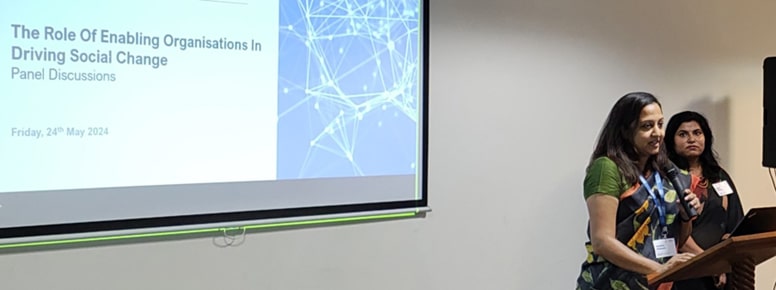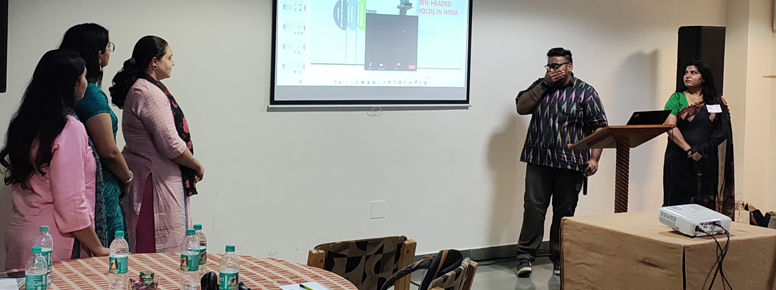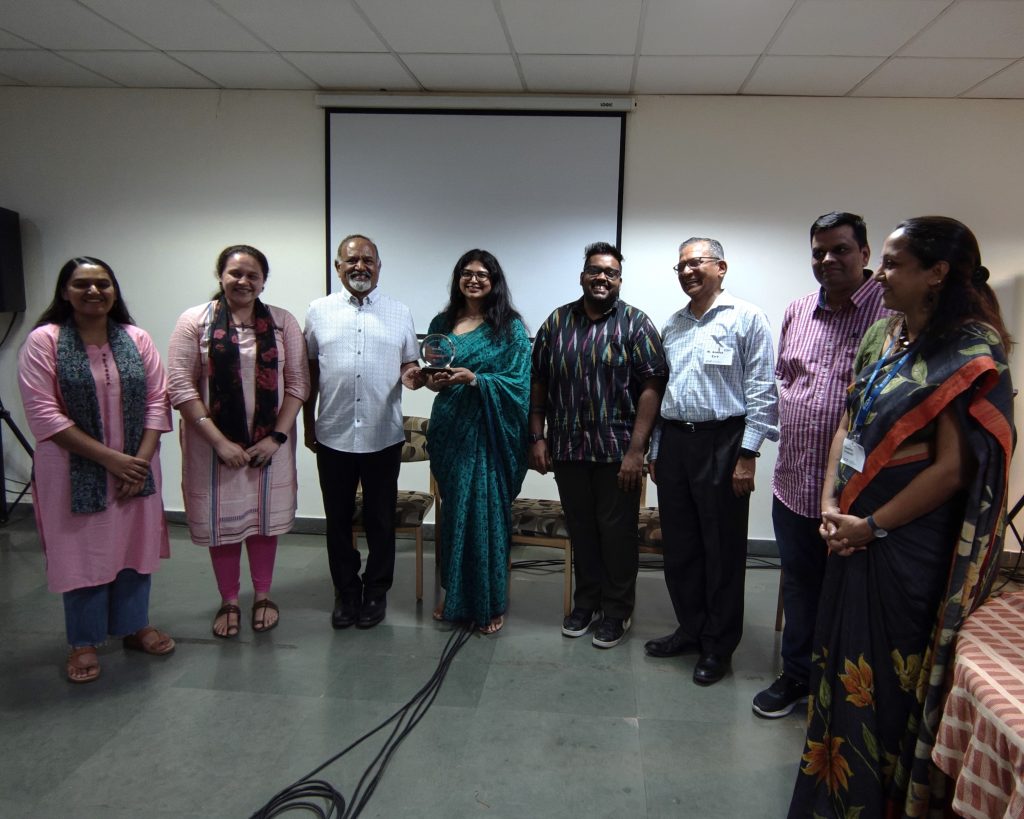CDSSI held the first edition of Code4Change 2023-24 (C4C) at the SAIACS CEO Centre on May 24 in Bengaluru. The event culminated with team DevSol4 being declared the winner. The team, from Development Solutions (DS), included Jagan (MEL Manager), Agrima (Project Manager), and Research Associates Sidra and Mallika, was among five finalists who presented their solutions to an esteemed jury, including Dr. Anand Rao (Professor of Data Science and AI at Carnegie Mellon University), Jayita Bhattacharya (Senior Director of Insights & Data at Capgemini), and Mayukh Choudhury (Co-founder of MILAAP).

The jury evaluated the teams on factors like relevance, methodology, data analysis, delivery, and impact. Teams were tasked with identifying key factors driving financial vulnerability in households, and assessing their impact on risk prediction. This required developing a model to identify, predict, and map the financial vulnerability of women-headed rural households. They were given a dataset that included household demographic profiles, socio-economic factors such as resource access and asset ownership, information on access to government schemes, and digital footprints of households. DevSol4 talks about their experience:
Why did you participate in Code4Change?
This hackathon was an excellent opportunity for us to showcase our ability to create real-time impactful solutions. We participated because:
- We wanted to leverage data science in developing innovative solutions to pressing problems.
- It was an opportunity for our research associates to gain valuable exposure and actively enhance their skills, thereby deepening their learning curve.
Tell us about the process. How did you work on your solution?
We created a Financial Vulnerability Index (FVI) to understand and measure the financial challenges faced by women-headed households in India, helping policymakers focus on those who need support the most. Through secondary research, we identified key barriers such as low income, limited financial knowledge, and poor access to services. Based on these insights, we developed four categories within the index: Banking and Digital Access, Asset Ownership, Social Welfare Support, and Income and Savings, reflecting the many factors that contribute to financial vulnerability. Further, we used a dimensionality reduction technique called Principal Component Analysis to determine the most relevant components and arrive at a single composite index. To enhance its accuracy, we employed a machine learning algorithm.

What did you discover?
Our analysis uncovered significant regional disparities in vulnerability. West Bengal, Telangana, and Tamil Nadu displayed the lowest levels of financial vulnerability, while Daman & Diu and Chandigarh showed the highest, with Chhattisgarh also emerging as highly vulnerable.
What kind of impact can your solution have?
The Financial Vulnerability Index (FVI) developed by the team can serve as a useful tool for social sector organisations, policymakers, and financial institutions to guide targeted assistance to financially vulnerable women-headed households in three ways:
Targeted Policy Interventions: The FVI can help policymakers identify the most vulnerable households, enabling focused social welfare efforts, such as subsidies, microfinance loans, and digital literacy initiatives, to ensure resources reach those in greatest need.
Strategic Planning for SPOs: SPOs can use the FVI to pinpoint high-need areas, allowing them to design programs – like financial literacy workshops, entrepreneurship training, and digital financial services – to support economic empowerment.
Enhanced Predictive Capabilities: The FVI’s machine learning model predicts future vulnerabilities, offering SPOs a proactive tool for planning. It can be scaled to offer insights at more localised levels, enabling tailored interventions for specific communities.
What were your learnings from the hackathon?
One of our biggest takeaways was how different teams came up with fundamentally different solutions (and findings) to the same problem using the same dataset. While all of us had a particular lens through which we approached the problem, there is merit in pooling our collective expertise in solving “wicked” social and policy problems.
Would you recommend Code4Change to others?
Of course! It is a great platform to bring together different stakeholders, all working on similar economic and social problems but with different approaches and expertise. It helps understand where there are gaps in evidence and research, and how they can be overcome. This can help with more efficient planning and allocation of resources. The judges too were open, collaborative and learned in their field, offering all participants insight into solving such problems.
It’s an avenue to use technological and data-related advancements in novel areas, and think beyond traditional quant and qual research methods. It’s also an opportunity for networking, collaboration, and knowledge sharing.
The Code4Change is a bi-annual social sector hackathon conducted by ISDM CDSSI.
Learn more about the hackathon here: https://www.isdm.org.in/cdssi/projects/code4change




